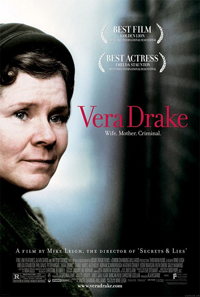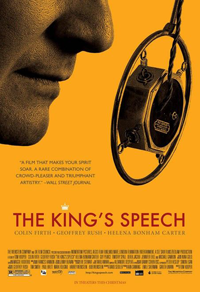(Originally published in Gapers Block on October 29, 2004. Vera Drake is now available on video and On Demand through Amazon, as well as on video through Netflix. I’ll be posting a review of Leigh’s latest film, Another Year, later today.)
![]()
![]()
![]()
![]()
![]()
Directed by Mike Leigh.
Starring Imelda Staunton, Phil Davis, Peter Wight, Eddie Marsan, Adrian Scarborough and Daniel Mays.
In Topsy-Turvy director Mike Leigh’s new drama, Vera Drake, Imelda Staunton (Sense & Sensibility, Shakespeare in Love) stars as the title character, a wonderfully cheerful, caring wife and mother of two grown children who works as a housekeeper for a few wealthy families in post-World War II England. Vera helps care for a few of her neighbors and her elderly mother as well, out of the kindness of her heart, and whenever a problem arises, Vera puts on a kettle — because a cup of tea fixes everything. Leigh takes his time setting up what a remarkably kind woman Vera is, but he drives home this point one time too many when her brother-in-law comments to her husband, Stan, that “she’s got a heart of gold, that woman.” It may seem to be an insignificant moment of excess, but it is still somewhat significant considering Vera performs illicit abortions for women who can’t afford or wouldn’t be allowed a legal one.
In contrast to Vera’s impoverished clientele, Susan (Sally Hawkins), the daughter of one of Vera’s wealthy employers, is raped by a suitor and becomes pregnant. Going through the legal channels, she procures her abortion for the sum of 150 guineas. By comparison, Lily (Ruth Sheen), the woman who puts those in need of help in touch with Vera, charges two guineas for Vera’s services. Vera is unaware of this, however; her own motivations are entirely charitable. While Susan is required to submit to a rather demeaning psychological exam, her ordeal is a simple one, on the whole. At the time, British law only permitted abortions when they were deemed liable to endanger the health of the mother, so Vera’s clients — including a woman with seven children already and a woman who didn’t want her husband to know she had cheated on him — would most likely not been granted one, even if they could afford one.
Vera administers the abortions by pumping soapy water (with a small amount of disinfectant, presumably for sterilization) into the woman’s vagina through a rubber syringe until they feel full. After a day or two, they feel a pain, they go to the bathroom, and it all comes out. She does this for a number of women in the first half of the film, and all of them presumably turn out fine. (We are told later on in the film that this was considered the safest method by other back-alley abortionists. In any case, she’s not scraping the women’ insides with a coat-hanger.) Eventually, however, one of Vera’s clients has complications and is taken to the hospital — the first of her clients to have any problems, to her knowledge, in her twenty or so years of administering them. While the girl’s mother initially claims that her daughter is having a miscarriage, the doctors realize the truth of the matter and call the police.
Staunton’s performance has already won her the Coppa Volpi for the Best Actress at the Venice Film Festival, and it is certainly riveting. Vera’s two main modes in the film are cheerful benevolence, as she is in almost the entire first half, and tearful remorse, as she is in almost the entire second half. During the first hour, this constancy makes the role seem almost one-note, but with one absolutely heart-wrenching shot, spotlighting Vera’s face as it transitions from the former to the latter as she realizes why the police have shown up at their home, Staunton masterfully demonstrates that trick lost on most Hollywood actors: subtlety.
Mike Leigh also shows an admirable amount of restraint, considering the film takes on such a hot-button issue. In one of the few times the film addresses the morality or immorality of abortion, Vera’s disapproving son Sid (Daniel Mays) trots out the baby-killing argument, but this line of conversation is … er, aborted … before it collapses into a series of all the tired, cliché arguments from either side of the issue. Vera never denies that what she did was illegal — and, of course, few people would argue that it should be legal for people who are not registered medical practitioners to give abortions.
It’s not really the morality of abortion in general that the film is really tackling, which I was tremendously grateful for, having always felt that the mainline arguments by pro-lifers and pro-choicers alike are utterly full of shit. What Vera Drake addresses is a much more practical subject: the morality of a society that only allows safe abortions to be accessible to the rich. Neither didactic nor melodramatic, Leigh has managed to create as objective a treatment of the subject as I can imagine. As such, Vera Drake is an effective condemnation of such a society — and, if that wasn’t enough, it’s just a damn fine movie.
Vera Drake is playing at the Landmark Century and the Century 12/CinéArts 6 in Evanston.


